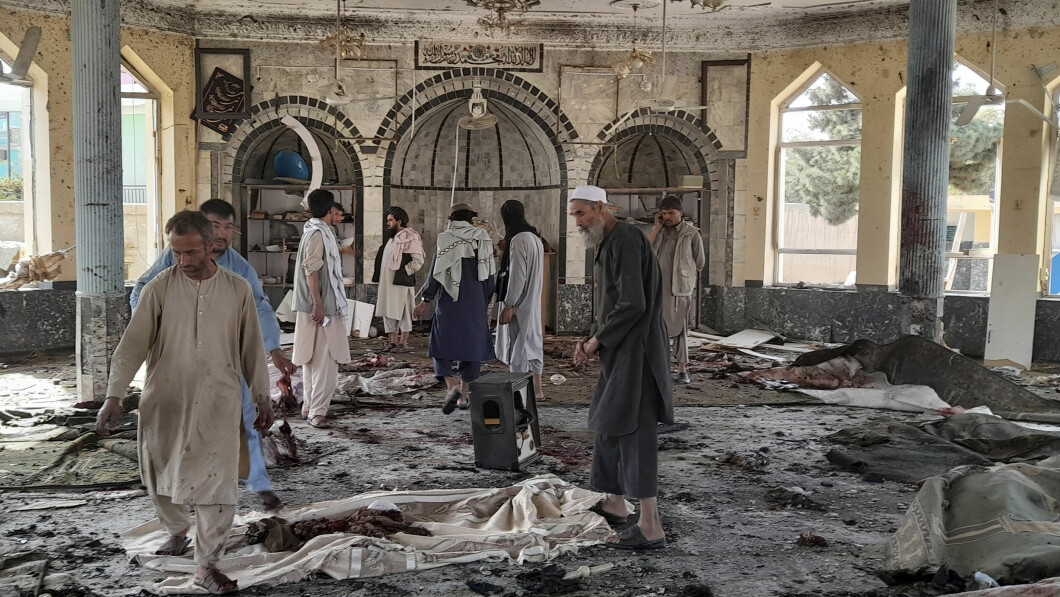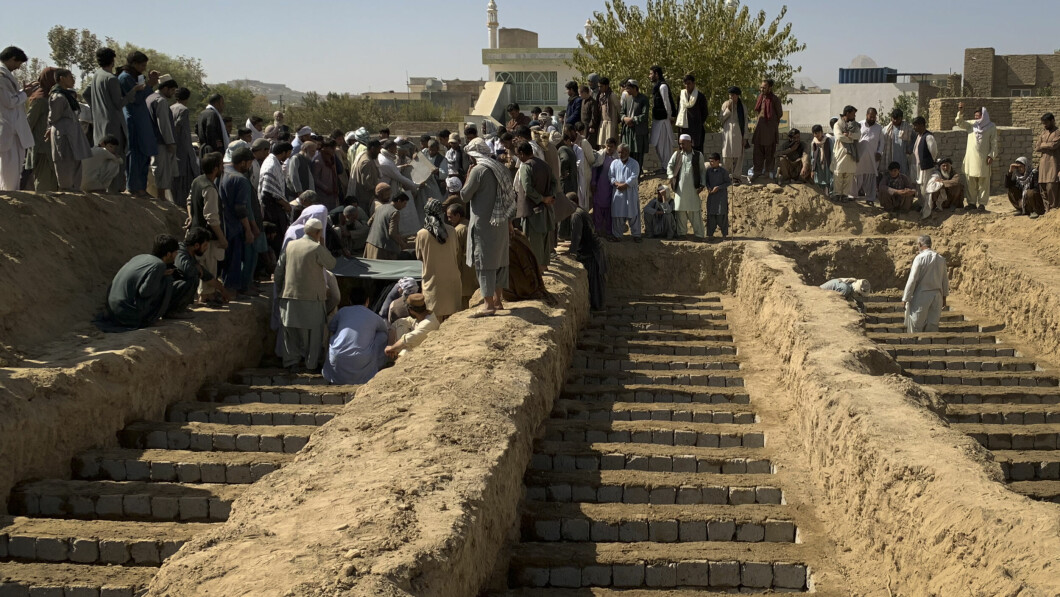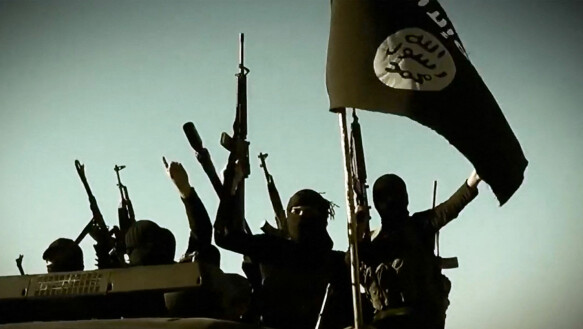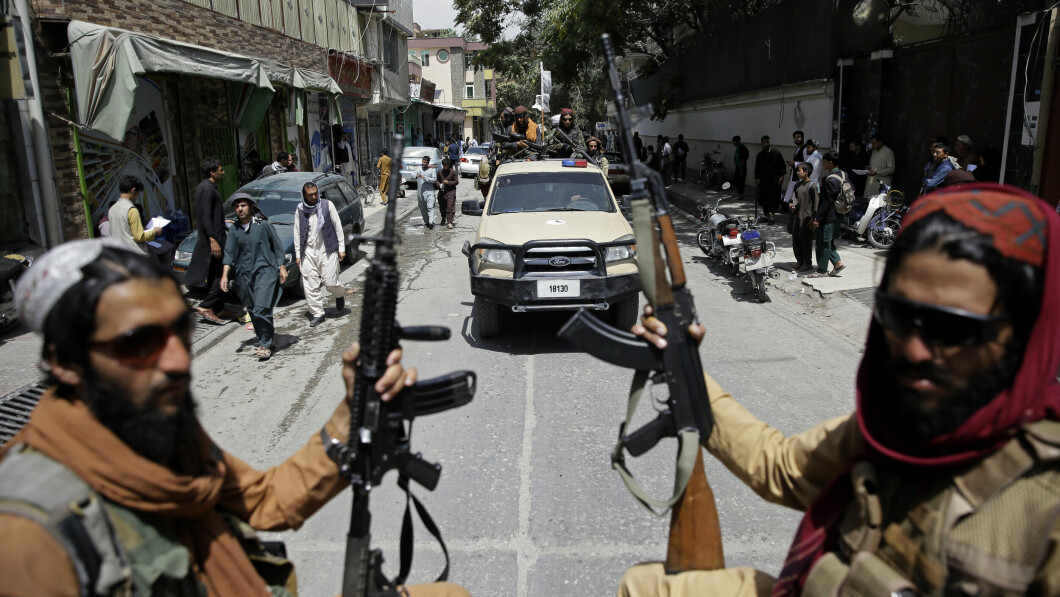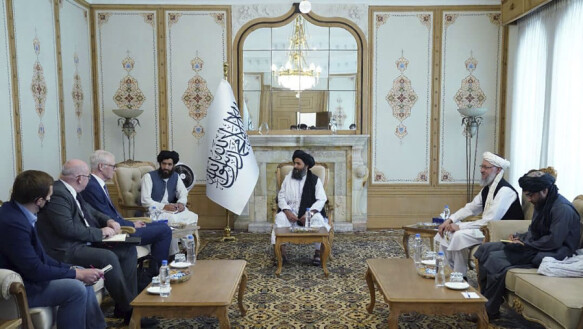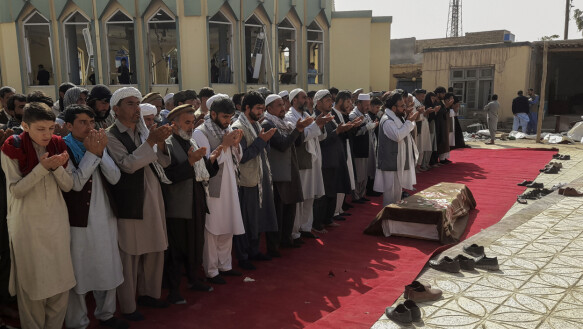The Islamic State in Khorasan Province (IS-K) carried out a series of terrorist attacks that claimed hundreds of lives in the past two months.
The attacks are an apparent attempt to undermine the Taliban, who in turn promised the outside world to suppress the group.
And in August, the Islamic State killed 169 people in two bombings in Kabul, including 13 US soldiers.
Earlier this month, the Islamic State killed 46 people in a Shiite mosque in Kunduz province, and on Friday claimed responsibility for the suicide attack on a mosque in Kandahar that killed 60 people.
ISIS also carried out a number of other terrorist attacks in both the capital and the provinces in the northeast of the country, and Taliban soldiers from them are being attacked almost daily.
contempt for the Taliban
Historically, the Islamic State has directed its attacks on the country. Now that US and other international forces have left, the Taliban is the country, says Andrew Maines. He is associated with the Extremism Program at George Washington University in the United States.
Both the Taliban and ISIS are proponents of a strict interpretation of Islam, but there is significant ideological opposition between the two groups, who hate each other deeply.
White flag: Police Chief Sherullah Badri in front of the white Taliban flag. Photo: Felipe Dana
The Taliban will establish an Islamic state within the borders of Afghanistan, while the Islamic State fights for a global caliphate and has declared war on all non-Muslims.
The Islamic State despises the nationalist agenda of the Taliban and does not recognize it as a true Islamic movement, which is the position they have long held toward al-Qaeda.
When the Islamic State ruled large areas of Syria and Iraq, they were more brutal in their tactics than the Taliban had ever been.
Terrorism: ISIS claimed responsibility for the bombing of a mosque in Kandahar, Afghanistan. Photo: Abdullah Sahel
Historic province
The Islamic State in Afghanistan saw the light of day in 2015, the year after the group declared a caliphate in Iraq and Syria.
The name of the Islamic State in Khorasan Province (IS-K) they took in reference to the historical Khorasan Province that covered most of Afghanistan, Iran and Central Asia in the Middle Ages.
Experts estimate that the group may have had at most about 3,000 warriors, but today it consists of 1,000 to 2,000 men.
Members come from both Afghanistan and Pakistan, and a large percentage of them are Taliban defectors.
More dead: The burial of relatives of the victims after the suicide attack by ISIS on a mosque in Kandahar on Friday. At least 47 people lost their lives. Photo: Siddiqullah Khan
Increase support
The Islamic State originally drew support from the small Salafist movement in Afghanistan, which has been largely marginalized by the Taliban in eastern Afghanistan.
Since then, many key Salafi leaders have distanced themselves from the Islamic State and their brutal tactics, and aerial and drone attacks by US forces have hit the Islamic State hard for several years.
However, since last year, when the Taliban sat at the negotiating table with the Americans, support for them has increased once again, and ISIS now appears stronger and more willing to act than ever before.
However, the Taliban downplays its capacity and describes ISIS as a marginal and extremist group without much popular support.
“They have no roots here,” said influential Taliban leader Abdul Hamid Hamasi.
Fear: The black ISIS flag was often visible when the terrorist organization carried out its brutal attacks and executions. The image is from one of the ISIS propaganda films released in 2014. The terrorist organization has no picture: Agence France-Presse
have the ability
But the terrorist attacks of the past two months leave no doubt about the damage that can be done by the Islamic State, and therefore the Taliban cannot take their eyes off them.
“The intensity and scale of the attacks show that they have the capability and can strike anywhere in Afghanistan, which surprised the Taliban,” said Ibrahim Buhais of the International Crisis Group.
– He believes that the Islamic State is not a threat in the short term.
The group is active in several places in Afghanistan, but does not control any areas. Their goal, above all, is to destabilize the country and undermine the Taliban’s promise of security.
The strategy is clearly to take small steps at a time, including recruiting members from other tribes and groups, freeing imprisoned members and attacking moderate Salafists and Taliban members.
“Together, this method is a form of insurgency that the Taliban are not equipped to deal with,” Maines said.
Recruitment: From day one, the Islamic State has been trying to attract Taliban members. Here Taliban fighters are patrolling Kabul. Photo: Rahmat Gul
must recruit
If ISIS is to be able to undermine the Taliban’s ability to rule Afghanistan, the group must succeed in recruiting much more members and garnering more support from the population than it does today.
The GSS had been trying to lure Taliban members from day one, and former Taliban leader Abdul Raouf Khadem was appointed vice president in 2015. He paid Taliban fighters who joined the Islamic State but were killed in a US attack throughout the following year.
Several other ISIS leaders have been killed in recent years, and in April Afghan intelligence arrested then-leader Abdullah Orokzai.
Today, the Islamic State in Afghanistan is allegedly led by Iraqi Shihab al-Muhajir, who has a background in both al-Qaeda and the so-called Haqqani network linked to the Taliban.
Offers of help: The United States offered to help hunt down ISIS in Afghanistan, which the Taliban leadership refused. Photo: AP
intelligence network
Bill Roggio of the Long War Journal, published by the Foundation for Defense of Democracies, believes the Taliban are capable of defeating ISIS, even without US air support.
Roggio notes that the Taliban have an extensive intelligence network in Afghanistan and have crushed many ISIS units.
He said that unlike the Taliban, the group cannot use bases in Pakistan and Iran.
The United States offered to help hunt down the Islamic State in Afghanistan, which the Taliban leadership repeatedly refused.
“We are able to deal with them ourselves,” said the movement’s political spokesman, Suhail Shaheen, after a meeting with US envoys earlier this month.
Victims: Several relatives perform prayers after the Islamic State in Khorasan carried out a suicide attack on a mosque in Kunduz province, earlier in October. Photo: Abdullah Sahel
minorities
If the Taliban is to succeed, they must show that they can protect Afghan minorities who have previously persecuted and terrorized, including the Hazara.
The Hazaras have suffered persecution throughout Afghanistan’s history. The last time the Taliban came to power, they carried out massacres against the Hazaras, sometimes in retaliation for massacres committed against ethnic Pashtuns.
The Islamic State has also carried out a number of attacks on the Hazaras, mainly because they are Shiite Muslims. Hundreds have been killed in such attacks in recent years, many of them targeting mosques.
In the wake of the mosque attack in Kunduz earlier this month, Taliban special forces were quickly deployed and promised that the perpetrators would be found and punished and that the “brothers” in the minority would be protected.
The Taliban made the same promise when a Shiite mosque was attacked in Kandahar on Friday. It remains to be seen whether the new rulers in Kabul will be able to deliver on their promises and defeat ISIS.
(NTB)

“Organizer. Social media geek. General communicator. Bacon scholar. Proud pop culture trailblazer.”



